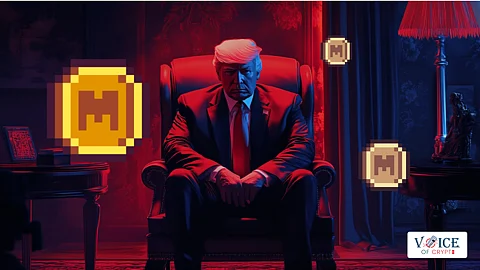

Key Insights
Trump has recently pivoted from being a crypto critic to a strong supporter, which has boosted industry confidence.
His executive order and the GENIUS Act created regulatory clarity for digital assets.
The Trump Tariffs present some short-term risks, but they may strengthen Bitcoin as a hedge over the long term.
Crypto’s position in the US economy has changed strongly over the last few years, especially under the Donald Trump presidency.
Trump, who was once a major critic, has now embraced digital assets and is working to make America the “crypto capital of the world.” Ever since his election win in November of last year, his administration has taken steps to reinvent everything from regulation to clarity.
Trump’s change of heart on the issue of crypto surprised many industry experts. Trump once famously called Bitcoin a scam and warned that it could undermine the U.S. dollar.
However, his stance has changed over the years, just as digital assets have gained influence in politics and finance.
Especially during his campaign for the presidency, he actively courted crypto supporters. He launched NFT collections, supported pro-crypto fundraising and promised to end Washington’s hostility toward the industry.
This strategy helped him win the heart of the crypto community, which later became one of the biggest demographics of his voter base.
One of Trump’s earliest actions was signing an executive order titled “Strengthening American Leadership in Digital Financial Technology.” It replaced some of the restrictive policies from the previous administration and pointed out a clear strategy to support crypto assets.
Part of the details of this executive order was the creation of a “Working Group on Digital Asset Markets”. This committee was led by David Sacks, the White House’s “Crypto and AI Czar,” alongside SEC and CFTC leadership.
Trump has also moved to ban CBDCs with the GENIUS Act’s passage. This bill was designed to prohibit the U.S. Federal Reserve from developing a U.S. Central Bank Digital Currency.
In addition, the CLARITY Act now requires that agencies review and reverse rules that hinder innovation in their regulatory moves.
One of the biggest outcomes of this change was the SEC’s reversal of Staff Accounting Bulletin 121, which blocked banks from offering crypto custody.
The administration has also proposed a national reserve of digital assets, where instead of auctioning seized Bitcoin, the government holds it as part of a long-term strategy.
Another major Tidbit from this executive order was the recent passage of the GENIUS Act, or Guaranteeing Essential National Infrastructure in US-Stablecoins by Congress. This was the first major federal law for stablecoins, and has been celebrated by the industry as a major milestone.
In particular, the GENIUS Act mandates that all stablecoins must be 100% backed by U.S. dollars or short-term Treasuries.
It also demands that Issuers must publish monthly reserve reports and undergo regular audits. Finally, by strengthening dollar-backed stablecoins, the US dollar now has a much wider reach in terms of cross-border finance.
The GENIUS Act created immediate market confidence, and major institutions have entered the stablecoin space in the last three months.
While Trump’s crypto policies have been positive so far, his trade policies have thrown some risks into the mix. For instance, he recently introduced sweeping tariffs on imports from China, Mexico and Canada.
These triggered volatility across the markets, including crypto and Bitcoin. Particularly, Bitcoin, which tends to track closely with risk assets, has dropped more times than once because of these tariffs.
Yet, analysts believe that more upside could be inbound. If the tariffs weaken the US dollar, Bitcoin may gain appeal as a hedge. Now that institutional adoption through the ETFs is rising, Bitcoin could become a safe alternative during tough times for fiat.
Disclaimer: Voice of Crypto aims to deliver accurate and up-to-date information, but it will not be responsible for any missing facts or inaccurate information. Cryptocurrencies are highly volatile financial assets, so research and make your own financial decisions.